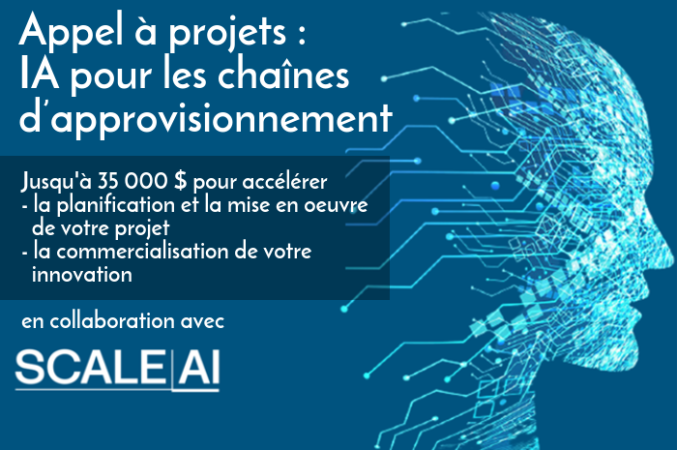September 25, 2020 |
Local,
Clean technologies,
Big data and Artifical Intelligence,
Advanced manufacturing 4.0,
Autonomous systems (Drones / E-VTOL),
Virtual design and testing,
Additive manufacturing
Appel à projets : IA pour les chaînes d'approvisionnement | Call for Projects: AI for Supply Chains

|
|
Pour visualiser ce message dans votre navigateur, cliquez ici
|
|
|
|
Appel à projets du CEIM
|
24/09/2020
|
|
|
|
|
|
|
|
Nouveaux programmes subventionnés pour accélérer
votre démarrage et la commercialisation de votre innovation
|
|
|
|
Dans le cadre d'une nouvelle entente avec Scale AI (la supergrappe d'intelligence artificielle canadienne), le CEIM est fier d'annoncer le lancement de deux nouveaux programmes d'incubation et d'accélération.
Ceux-ci s'adressent aux jeunes startups ayant développé une solution d'IA appliquée aux chaînes d'approvisionnement et pourraient s'accompagner d'une aide financière pouvant aller jusqu'à 35 000 $ par projet.
Pour être admissibles, les entreprises doivent :
|
|
|
- avoir leur siège social au Québec
- présenter un projet innovant à fort potentiel de croissance et d'exportation
- être en opération depuis moins de 2 ans, avec peu ou pas de revenu pour bénéficier des services d'incubation ou
- être en opération depuis moins de 5 ans, avec des revenus annuels de 500 000 à 5 M$ pour bénéficier des services d'accélération
|
|
Des services de consultation sur mesure,
adaptés en fonction de vos besoins spécifiques
|
|
|
|
|
|
|
|
- Validation du potentiel commercial/proposition de valeur
- Stratégie de mise en marché/positionnement
- Plan d'affaires, planification stratégique
et financière
- Stratégie P.I, encadrement juridique
et crédits d'impôt RS&DE
|
- Revue du plan marketing
- Diagnostic commercial/potentiel à l'exportation
- Acquisition de clients/développement
de marché
- Processus d'embauche d'un(e) représentant(e) aux ventes
- Développement des affaires
|
| |
|
|
|
POUR PLUS D'INFORMATION ET SOUMETTRE VOTRE DEMANDE
Les projets seront sélectionnés en continu, en collaboration avec Scale AI, mais le nombre de dossiers retenus est limité. Les entreprises intéressées sont donc invitées à prendre contact avec nous et à soumettre leur candidature sans tarder. Pour plus d'information, prière de contacter Serge Bourassa (sbourassa@ceim.org).
|
|
|
| |
|
|

|
|
|
|
|
|
New subsidized programs to accelerate your startup
and the commercialization of your innovation
|
|
|
|
As part of a new partnership agreement with Scale AI (Canada's Artificial Intelligence Supercluster), CEIM is proud to announce the launch of two new incubation and acceleration programs.
These are aimed at young startups that have developed an AI solution applied to supply chains and could be accompanied by financial support of up to $ 35,000 per project.
To be eligible, companies must:
|
|
|
- have their head office in Quebec
- present an innovative project with high growth and export potential
- be in operation for less than 2 years, with little or no income to take advantage of our incubation services or
- be in operation for less than 5 years, with annual revenues of $ 500,000 to $ 5 Million to take advantage of our acceleration services
|
|
Customized consulting services
that are tailored to your specific needs
|
|
|
|
|
|
|
|
- Evaluation of market potential/value proposition
- Go-to-market strategy/positioning
- Business, strategic and financial planning
- I.P strategy, legal counsel, R&D tax credits
|
- Marketing plan review
- Commercial diagnostic/export potential
- Customer acquisition/market development
- Hiring of a sales representative
- Business development
|
| |
|
|
|
FOR MORE INFORMATION AND TO SUBMIT YOUR APPLICATION
The projects will be selected, in collaboration with Scale AI, on a continuous basis but the number of shortlisted applications is limited. Interested companies are therefore encouraged to contact us and submit their application without delay. For more information, please contact Serge Bourassa (sbourassa@ceim.org).
|
|
|
| |
|
|

|
|
|
You are receiving this email because you opted-in your email address sbourassa@ceim.org to receive updates from us.
Add in your contacts list to ensure that you receive our emails in your inbox.
To unsubscribe or manage your email preferences, click here.
CEIM | 33, rue Prince | Montreal, QC H3C 2M7 Canada
Copyright © 2020 CEIM
|
|
|
|
On the same subject
-
October 1, 2021
Les brèves de l'actualités vous sont partagés par le Programme Accélérateur 360 - cliquer sur le document pour y avoir accès
https://www.aeromontreal.ca/accelerateur360.html
-
November 18, 2022
La sherbrookoise NGC Aérospatiale fait partie de l’équipe menée par Canadensys Aerospace qui s’est vu octroyer un contrat par le gouvernement canadien pour concevoir le premier astromobile lunaire canadien. L’entreprise du boulevard Industriel utilisera son expertise en systèmes de navigation autonome et d’évitement d’obstacle dans la conception de l’astromobile de 30 kg qui sera lancée en 2026 et qui explorera le pôle Sud de la Lune.
-

April 6, 2020
We have funding opportunities for Canadian innovators who can help fight the COVID-19 pandemic.
The Public Health Agency of Canada and the National Research Council of Canada are looking for a Point of Care and Home Diagnostic Kit. The National Research Council of Canada has also modified their Low Cost Sensor System challenge to address needs for COVID-19.
Think you can solve one of these challenges? Compete for funding to prove your feasibility and develop a solution!
COVID-19 Funding Opportunities
COVID-19 Challenge - Point of Care and Home Diagnostic Kit for COVID-19
Défi COVID-19 - Trousse de diagnostic au point de service et à domicile pour le COVID-19
COVID-19 Challenge - Low-cost sensor system for COVID-19 patient monitoring
Défi COVID-19 – Système de capteurs peu coûteux surveiller l'état des patients atteints de la COVID-19
Nous avons des opportunités de financement pour les innovateurs canadiens qui peuvent aider à lutter contre la pandémie COVID-19.
L'Agence de santé publique du Canada et le Conseil national de recherches du Canada sont à la recherche d'un kit de diagnostic aux points de service et à domicile. Le Conseil national de recherches du Canada a également modifié son Défi du système de capteurs peu coûteux pour surveiller l'état des patients pour répondre aux besoins de COVID-19.
Vous pensez pouvoir résoudre l'un de ces défis ? Participez pour avoir la chance de recevoir du financement pour prouver votre faisabilité de votre solution et la développer !
Possibilités de financement liées à la COVID-19
Want to change how you receive these emails?
You can update your preferences or unsubscribe from this list.
Vous souhaitez changer la façon dont vous recevez ces courriels?
Vous pouvez mettre à jour vos préférences ou retirer votre nom de la liste de distribution.
All news



